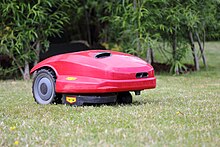**Types of Lawn Mowers**:
– Gasoline/petrol rotary push mower
– Residential riding mower
– Battery-powered robotic mower
– Commercial zero-turn mower
– Blade styles: rotary mowers and cylinder/reel mowers
**History and Evolution**:
– Invented in 1830 by Edwin Beard Budding
– Spread of lawn mowers and early improvements
– Introduction of gasoline-powered mowers
– Development of petrol engine-powered mowers
– Notable Innovations such as chain-driven mowers and self-propelled riding lawn tractors
**Energy Sources and Innovations**:
– Gasoline-powered mowers and their maintenance requirements
– California’s phase-out of gasoline-powered lawn mower engines by 2024
– Electric mowers, including corded and cordless options
– Propane-powered mowers as an alternative energy source
– Hand-powered mowers and other notable types like hover mowers and robotic mowers
**Components and Operation**:
– Main parts of a rotary mower and their functions
– Types of drives for mowers: manual, hydrostatic, and electric
– Mounting devices on riding mowers for various tasks
– Types of lawn mower decks and their materials
– Mulching mowers and their features for handling clippings
**Professional Equipment and Environmental Impact**:
– Professional grass-cutting equipment used by large establishments
– Environmental impact of lawn mowers, including emissions and noise pollution
– Maintenance and operation considerations for efficient and safe use
– Safety and health concerns with lawn mowers, including injury prevention and occupational hazards
– Related topics on lawn mowers, historical references, and safety measures for children
A lawn mower (also known as a mower, grass cutter or lawnmower) is a device utilizing one or more revolving blades (or a reel) to cut a grass surface to an even height. The height of the cut grass may be fixed by the design of the mower but generally is adjustable by the operator, typically by a single master lever or by a mechanism on each of the machine's wheels. The blades may be powered by manual force, with wheels mechanically connected to the cutting blades so that the blades spin when the mower is pushed forward, or the machine may have a battery-powered or plug-in electric motor. The most common self-contained power source for lawn mowers is a small (typically one-cylinder) internal combustion engine. Smaller mowers often lack any form of self-propulsion, requiring human power to move over a surface; "walk-behind" mowers are self-propelled, requiring a human only to walk behind and guide them. Larger lawn mowers are usually either self-propelled "walk-behind" types or, more often, are "ride-on" mowers that the operator can sit on and control. A robotic lawn mower ("lawn-mowing bot", "mowbot", etc.) is designed to operate either entirely on its own or less commonly by an operator on a remote control.




Two main styles of blades are used in lawn mowers. Lawn mowers employing a single blade that rotates about a single vertical axis are known as rotary mowers, while those employing a cutting bar and multiple blade assembly that rotates about a single horizontal axis are known as cylinder or reel mowers (although in some versions, the cutting bar is the only blade, and the rotating assembly consists of flat metal pieces which force the blades of grass against the sharp cutting bar).
There are several types of mowers, each suited to a particular scale and purpose. The smallest types, non-powered push mowers, are suitable for small residential lawns and gardens. Electrical or piston engine-powered push-mowers are used for larger residential lawns (although there is some overlap). Riding mowers, which sometimes resemble small tractors, are larger than push mowers and are suitable for large lawns, although commercial riding lawn mowers (such as zero-turn mowers) can be "stand-on" types and often bear little resemblance to residential lawn tractors, being designed to mow large areas at high speed in the shortest time possible. The largest multi-gang (multi-blade) mowers are mounted on tractors and are designed for large expanses of grass such as golf courses and municipal parks, although they are ill-suited for complex terrain.
English
Alternative forms
- lawnmower
- lawn-mower
Pronunciation
Noun
lawn mower (plural lawn mowers)
- Alternative spelling of lawnmower
Quotations
- 1898 Robert Budd Ross et.al.